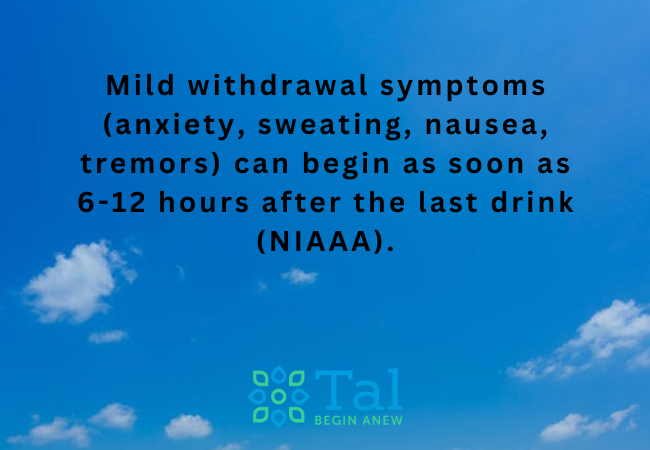Alcohol withdrawal is a serious condition that can be life-threatening if not managed properly. Many people attempting to quit drinking on their own underestimate the severity of withdrawal symptoms, leading to dangerous complications. Understanding the risks associated with alcohol withdrawal and the importance of medical detox can help individuals make informed decisions about their recovery journey.
Understanding Alcohol Withdrawal
Alcohol withdrawal occurs when a person who has been drinking heavily for an extended period suddenly stops or significantly reduces their alcohol intake. The body, which has adapted to the presence of alcohol, struggles to regain balance, leading to a range of withdrawal symptoms.
Common Alcohol Withdrawal Symptoms
Withdrawal symptoms can vary in severity, depending on factors such as the duration and intensity of alcohol use, overall health, and individual differences. Some common symptoms include:
- Anxiety and irritability
- Nausea and vomiting
- Sweating and chills
- Tremors (shaking hands)
- Headaches
- Insomnia and sleep disturbances
- Increased heart rate
- Hallucinations (seeing or hearing things that are not there)
Severe Alcohol Withdrawal Symptoms (Delirium Tremens)
In some cases, withdrawal can escalate to a severe condition known as Delirium Tremens (DTs), which is a medical emergency. DTs can cause:
- Confusion and disorientation
- Seizures
- High fever
- Severe agitation
- Rapid heart rate
Without proper medical intervention, Delirium Tremens can be fatal. This is why seeking professional help at an alcohol rehab center in Ohio is essential for safety and effective recovery.
The Role of Medical Detox in Alcohol Withdrawal
Medical detox is the safest and most effective way to manage alcohol withdrawal symptoms. Unlike quitting “cold turkey,” medical detox provides supervised care, ensuring that individuals withdraw from alcohol in a controlled and safe environment.
Benefits of Medical Detox
- Medical Supervision and Monitoring
- Healthcare professionals monitor vital signs, administer medications, and provide immediate intervention in case of complications.
- Medications for Symptom Management
- Certain medications help reduce withdrawal symptoms, lower the risk of seizures, and prevent severe complications like DTs.
- Emotional and Psychological Support
- Detox centers offer counseling and mental health support to help individuals manage anxiety and cravings.
- A Controlled, Substance-Free Environment
- Being in a structured setting minimizes exposure to triggers and temptations, increasing the chances of a successful detox process.

Risks of Detoxing Without Medical Supervision
Attempting to detox from alcohol without medical supervision is extremely dangerous. Risks include:
- Seizures – Withdrawal-related seizures can be fatal if not managed promptly.
- Heart Complications – Increased heart rate and blood pressure spikes can lead to cardiovascular issues.
- Dehydration and Malnutrition – Vomiting, sweating, and lack of proper nutrition can weaken the body.
- Psychological Distress – Severe anxiety, depression, and suicidal thoughts may arise without proper mental health support.
Seeking help from an addiction service center in Ohio ensures that individuals receive professional care during this challenging phase.
Transitioning from Detox to Treatment
Detox alone is not a cure for alcohol addiction. After detox, individuals must enter a comprehensive treatment program to address the root causes of addiction and develop strategies for long-term sobriety.
Key Components of Alcohol Addiction Treatment
- Therapy and Counseling
- Individual therapy, group counseling, and behavioral therapy help individuals understand triggers and develop coping mechanisms.
- Medication-Assisted Treatment (MAT)
- Certain FDA-approved medications can help prevent relapse and support long-term recovery.
- Support Groups and Aftercare Planning
- Programs like Alcoholics Anonymous (AA) and sober living communities provide ongoing support.
The Importance of Seeking Professional Help
Recognizing the dangers of alcohol withdrawal and the benefits of medical detox can be a life-saving realization. Professional treatment centers provide the necessary resources, medical care, and emotional support for a successful recovery.
If you or a loved one needs help, Tal Behavioral Health offers compassionate and effective treatment options, including Alcohol Addiction Treatment in Cleveland, Ohio. Contact us at (216) 930-1957 to take the first step toward recovery today.
Frequently Asked Questions (FAQs)
How long does alcohol withdrawal last?
Mild symptoms may last a few days, while severe withdrawal can persist for a week or more.
Can alcohol withdrawal be fatal?
Yes, severe cases like Delirium Tremens can be life-threatening without medical supervision.
What medications help with alcohol withdrawal?
Doctors may prescribe benzodiazepines, anticonvulsants, or beta-blockers to manage symptoms.
Is medical detox necessary for mild alcohol withdrawal?
Even mild symptoms can worsen unexpectedly, so professional evaluation is recommended.
What happens after detox?
Individuals enter a structured treatment program to address addiction and prevent relapse.
Seeking professional help for alcohol withdrawal is a crucial step toward recovery. Reach out to Tal Behavioral Health for expert care and support.


